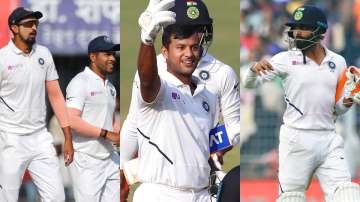Openers conundrum settled, pacers shining and Jadeja's second coming: India's 2019 Test review
Team India sits comfortably at the top of the World Test Championship after its final Test in the calendar year. How dominant has the team been in 2019, though?

Just eight matches for 2019 - one of India's shortest Test season - all over in just three months. However, India maintained their level of dominance as expected with the pacers showing their new colour, the long-standing opening conundrum ending and skipper Virat Kohli achieving new heights with his captaincy responsibilities. And at the end of eight matches, India, the still No.1 ranked Test side, are sitting atop in the ICC World Test Championship with a massive 360 points from three series. So here is a review of India's performance in Tests in 2019 ahead of their next campaign in the format, against New Zealand in February 2020.
Pacers outperform spinners at home
95 wickets at 15.16 with a strike rate of 31.06 -- those have been the numbers of Indian pacers after eight Tests in 2019. And the numbers just don't reveal India's best-ever performance by pacers in a calendar year, their combined average and strike rate are the best for any team's pace bowlers in a calendar year (with minimum 50 wickets). Moreover, this is the first time since England's 1978 pace combination that three pacers have taken more than 20 wickets in a calendar year while averaging less than 20. And what made their performance even more interesting is in their last five matches where the pacers dominated at home, India were without their best, Bumrah. The spinners managed only 50 wickets at 28.22 with a strike rate of 59.6.
At home, the pacers picked 59 wickets as against 38 wickets by the spinners. And one of their Test victories at home (in Kolkata) included the spinners going wicketless, the first instance at home.
While there are little questions over the pacers, the spinners will have a hard time going into 2020. Ashwin picked 20 wickets in five matches at home. He was benched for the West Indies tour. Ravindra Jadeja bagged 13 wickets at home at 36.07 -- his worst-ever at home season. With India having no Tests at home until 2021, it seems uncertain over the future of the two in the playing XI. Jadeja might still have a chance given his impressive batting at No.6 in 2019 and can hence slot in for the role of primary spinner. But then there is Kuldeep Yadav, who has although stayed on the sidelines throughout 2019, who can prove to be a good option on overseas tracks.
End of the opening conundrum
11 different openers have been tried under Kohli's captaincy. And the last two years have been the most troublesome for Indian openers, especially during the overseas tours. By the start of the year, Mayank Agarwal had made his way for the opening slot after gritty 76 and 42 in his debut in Melbourne. Eventually, as the year unravelled, Mayank cemented his place with two double centuries in back-to-back series, and amassing 754 runs in 2019 at 68.54.
KL Rahul was given the other spot in the series against West Indies. However, after Rahul was axed, the selectors and team management put their weight behind Rohit Sharma. And he repaid it in style scoring 556 runs with three centuries (including a double ton) at 75.95. He even bagged the Man of the Series award after his prolific show against South Africa at home.
This implies, Mayank and Rohit will be heading to New Zealand as India's openers next year. But who will be the back-up option? Shubman Gill was called up for the South Africa series after Rahul was dropped. Meanwhile, Prithvi Shaw, who was sidelined with an injury last December followed by a suspension, is raring to come back for his old spot. Besides, Abhimanyu Easwaran and Priyank Panchal have been going strong over the last couple of domestic season.
Jadeja’s new promotion
Since 2018, Jadeja has batted 16 times between No.4 and 9 lifting his average from 29.40 to 35.92. 15 of those innings were when he batted between No.6 and 9, averaging 61.60 -- the best by a lower-order batsman. In the five matches he played at home, he scored three half-centuries at No.6, batting ahead of Ashwin and Wriddhiman Saha. But will India persist with this plan in overseas as well? In 2018, India were urged to play four pacers abroad and Hanuma Vihari slotted in at No.6 followed by Hardik Pandya.
Wriddhiman vs Pant
The debate had started long before Wriddhiman had even made his domestic return post the surgery and 365 days later, the question remains the same despite his astounding return. He eventually made his return after back-to-back fifties for India A, but was benched in the Windies series. However, with India returning home, Wriddhiman was selected as the primary keeper and he showed by he is the best in the world with the gloves.
Meanwhile, Pant has been struggling with that one factor that has kept him strong in the Indian squad - his batting. He was eventually released by the management to regain his form through domestic cricket and KS Bharat was called up as Wriddhiman's back-up for the second Test against Bangladesh. With competition heading overseas next year, will Wriddhiman retain his spot solely based on his wicketkeeping or will India look to Pant for some batting assistance, or will Bharat emerge out of the blue?
Slip catching a problem again?
If there was a drawback of the Indian side throughout their dominating home season this year, it has been their slip catching. According to ESPNCricinfo, India dropped 14 opportunities in five matches, seven of which were considered as regulation catches. The slip cordon needs to improve given the impressive form of the pacers.